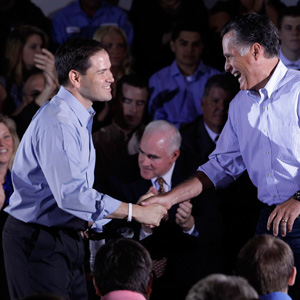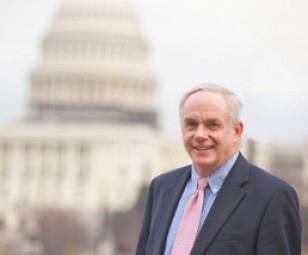Don’t Expect a Replay of McCain-Palin from 2008
It’s one of official Washington’s favorite parlor games these days — who will the presumptive Republican Party presidential nominee, Mitt Romney, pick for his running mate?
Let’s start with some basic differences between Romney and John McCain, the man who ran under the Republican banner four years ago. McCain was a political gambler, and that was never more apparent than when he chose Alaska Governor Sarah Palin to be his vice presidential running mate.
Initially, Palin excited the Republican base and intrigued many independent voters. But Palin’s lack of experience and unfamiliarity with foreign policy issues quickly became apparent and made her a liability with many. Now it seems the Romney camp is determined to avoid repeating that kind of pick in 2012.
With that in mind, here are some pros and cons on some of the people being talked about as possible vice presidential candidates on this year’s Republican ticket:

Marco Rubio (L) and Mitt Romney campaigning together this week in Pennsylvania -- Trial run or the real thing? Photo: AP
Senator Marco Rubio — Rubio was elected with conservative Tea Party support and represents one of the foremost battleground states in presidential elections, Florida. Rubio is young and dynamic and his Cuban-American background could prove appealing to Hispanic voters in November, and that could be crucial.
Hispanics are the fastest growing ethnic group in the United States and their political clout will only increase in the decades to come. At the moment, President Obama enjoys a huge lead over Mitt Romney among Hispanic voters and selecting Rubio could help the Republican ticket cut into that advantage.
On the down side, Rubio is still relatively inexperienced on the national stage. And in light of the Palin experience from 2008, the Romney camp is likely to be especially careful about selecting someone whose readiness might become an issue in the campaign.
Senator Rob Portman — If Marco Rubio qualifies as an exciting pick, then Rob Portman of Ohio might be considered the leading safe pick. Portman is not exciting, but has experience as a senator, congressman, trade representative and head of the budget office during the George W. Bush presidency.

Rob Portman (R) inspects severe weather damage in his home state of Ohio last month. Photo: AP
Portman would probably be seen as the clearest anti-Palin choice of the group. He is well versed in domestic and foreign policy, a deficit hawk and someone whose credentials are probably beyond question. He also hails from Ohio, another key swing state in the election.
No Republican has ever been elected president without carrying Ohio. But if Romney needs someone to help him with women voters, Hispanics or even independents, Portman might not be the pick. His association with the Bush administration might also work against him, along with the desire of some Republicans for Romney to pick someone more exciting.
Former Florida governor Jeb Bush — Kind of a wild card pick. Bush initially seemed to open the door to the possibility, then tried to shut it. He decided against a presidential run this year but he remains fairly popular within the Republican Party and is someone with a good track record of winning independent swing voters in Florida.
Jeb Bush’s biggest problem may be his last name. Four years after George W. Bush left town, many Republicans remain concerned that Americans may not be ready for another Bush on a national ticket. Since 1980 when George H.W. Bush became Ronald Reagan’s running mate on the Republican ticket, a Bush has been on the national ballot as either a nominee for president or vice president in six of the eight presidential election cycles ending in 2008.

Former Florida Governor Jeb Bush -- One Bush too many for the national ticket? Photo: AP
Beyond the three mentioned above there are several more potential running mates for Romney to choose from.
New Jersey Governor Chris Christie is popular with Republicans and many independents, but he could overshadow the top of the ticket. Congressman Paul Ryan of Wisconsin is a rising star in the Republican Party, but his authorship of controversial Republican budget proposals in the House of Representatives might make him a lightning rod for Democrats opposed to big cuts in government.
Some of the lesser known figures nationally who could get consideration include Virginia Governor Bob McDonnell, Indiana Governor Mitch Daniels, South Dakota Senator John Thune, Louisiana Governor Bobby Jindal, South Carolina Governor Nikki Haley and New Mexico Governor Susana Martinez.
It’s possible Romney might reach out to former rival Rick Santorum, but he probably wouldn’t be a good fit for a presidential candidate worried about his standing with women, Hispanic and independent voters.
The ultimate wild card? How about former Secretary of State Condoleezza Rice. She led the field in a recent CNN-ORC public opinion poll even though she, like virtually all of those mentioned above, professes to have no interest in the job.
One more footnote to all of this. In the modern era of U.S. politics, and frankly throughout American history, becoming vice president has generally been a fast track to eventually becoming president. Starting with Harry Truman in 1944, vice presidents who eventually became president include Richard Nixon, Lyndon Johnson, Gerald Ford and George H. W. Bush.
Nixon was Dwight Eisenhower’s vice president in the 1950’s and it took him two tries to win the White House, finally succeeding in 1968.
Johnson reluctantly accepted John Kennedy’s invitation to be his No. 2 in 1960 and then was largely shunned by the Kennedy White House. That all changed in an instant on November 22nd, 1963, when the president was assassinated in Dallas, Texas.
Ford was appointed vice president under Nixon after the resignation of Spiro Agnew in 1973, and later succeeded Nixon upon his resignation in 1974. George H.W. Bush was Reagan’s main competitor for the 1980 Republican nomination but later agreed to be his running mate and served two terms as vice president before winning the White House in his own right in 1988.
So even though most people initially say they would not be interested in becoming vice president, the sweep of history suggests that those who do have political ambitions would be wise to think carefully before saying no.

